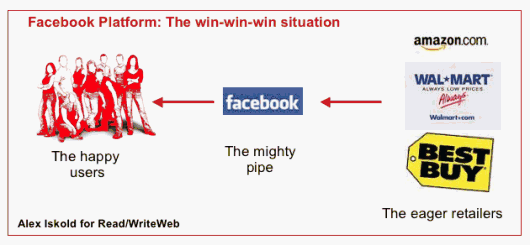This week the Wall Street journal published an excellent piece on the upcoming Facebook Platform, which Josh also covered for Read/WriteWeb. The WSJ article outlined a Facebook platform that will allow companies to offer their products and services to Facebook users, enabling them to tap into Facebook’s large network. With widgets (which can plug into networks like Facebook) getting more popular, this is welcome news to many startups – and probably e-commerce giants too.

But what’s in this for Facebook? Could they end up eating Yahoo’s lunch?
If the rumors are true, this hot startup has decided to fight off the billion dollar acquisition offers and make a run for the holy grail of the (still recovering) tech world – the IPO. Certainly Facebook has got the audience and everyone’s attention. Still, to appease Wall Street there needs to be rapid and continuous revenue growth. The current 150M ad revenue is a good start, but to beat the 1B offer reputedly made to them by Yahoo, Facebook needs to reach Web Giant size – billions of dollars of market value. Since two years is a very short time, every move that Facebook makes needs to be geared towards the IPO. Could the platform play be a major revenue generator? It seems like this will be the case.
Beyond Facebook’s Current Monetization
As described in the WSJ article, the major source of today’s Facebook revenue is advertising. While this is a great source, there is a problem. Advertisers are paying for impressions and clicks, but there is only so much space in the pages and only so many page loads that can be expected from each user. In short the advertising revenue model for a single web site does not have great scale.
What else can be done to leverage Facebook’s audience? Either Facebook can open its audience and try to take it outside of the wall, or it can bring more services to the audience. Taking the audience elsewhere is not an option because of the nature of Facebook. So the company needs to figure out a way to bring more services into the network. In a way, this puts Facebook onto a collision course with Yahoo!. And if this is the case, Facebook could be onto a winner – because it appears that Facebook is planning to leverage its platform to bring in external services, instead of having all services homegrown. This is a very smart strategy and here is why.
Facebook Platform Play

In a word, this play could turn Facebook into a pipe. Being a pipe that gets a cut in all transactions that occurs between a lot of Facebook users and a lot of outside services would make Facebook into a gigantic marketplace. The key thing about this play is that the platform ensures that Facebook is in control. To understand why, consider the current situation in the widget market. Providers make them, users love them and the networks (think MySpace) hate them. This is because there is no way for the social networks to derive revenue from the widgets. They simply have no control over what goes on inside the widgets. So the problem is not spam, it’s revenue (or lack thereof). Why should the social networks give up their space and user eyeballs to something earns them no revenue? They do not want to do that.
But there is a way to turn the problem into a win. The very space that widgets bid for can be monetized by the social network. An obvious monetization is to charge rent – or an advertising fee. A more interesting play is to do a revenue share model, because this has a potentially much larger upside. In the current state of the widgetsphere, there is no way to execute either model. The rent cannot be charged because it is the users that place widgets into their profiles. And revenue sharing is impossible for the same reason.
To fix the problem, there needs to be an API. A contract between the provider of the widget and the social network that ensure the identity of the widget provider – and then allows a way for the social network to get paid. If Facebook could figure out how to do this in a way that makes the retailers happy and keeps the users from screaming, then this is a huge win for them. Consider a scenario where Amazon rolls out something as simple as books and Facebook gets a cut of each transaction. That could happen in many verticals, from books and movies to electronics and travel. And as Facebook is growing beyond the college population, and as its current college population graduates, there seems to be potential for a big upset brewing here – in the sense that Facebook could significantly eat into Yahoo’s business.
Conclusion
WSJ states that Facebook does not plan to tap into the revenue of companies who build services around the platform. If that is true, it would be a shame. Why would they go into the exercise of building a platform that they do not plan to monetize, if they would like to go the IPO route? More likely than not, there is a really big plan to make money on the platform – but I guess we will have to wait at least until Thursday (when Facebook makes its official announcement) or possibly longer to understand what it is.









